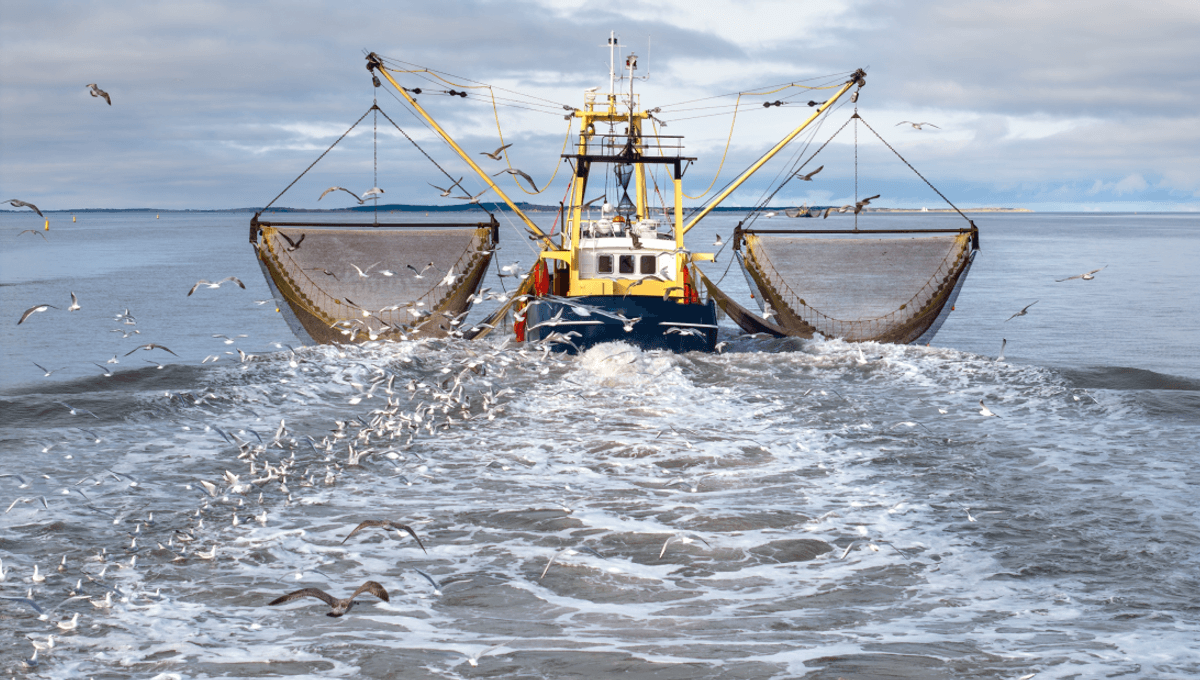
Sir David Attenborough’s latest film OCEAN includes chilling footage of trawling from a point-of-view never seen before: the animals in its path. Cephalopods and rays can be seen fleeing the wall of rope and metal as it charges across the seabed destroying everything in its path, a heartbreaking visual that powerfully underpins Attenborough’s message: “If we save the sea, we save the planet.”
As it stands, the damage we are doing to the seas is visible from space. You see, each time a trawler descends its net and charges across the seabed, it stirs up billowing plumes of sediment creating trails of devastation that have been photographed in satellite imagery. Some sediment trails span for tens of kilometers, and each marks the destruction of an ecosystem that can takes years to recover.
A 2017 study published in Proceedings of the National Academy of Sciences found that trawling the ocean floor can strip it of up to 41 percent of the seabed, a loss in biodiversity that can take over six years to recover. Around a quarter of all wild-caught seafood is caught using trawlers each year, giving you an idea of the scale of this destruction, but what’s more chilling than what we can see from space is the view of those animals’ last moments before they go into the net.
“From the surface, you would have no idea that this is happening,” says Attenborough in the clip. “It has remained hidden from view – until now.”
“A modern industrial bottom trawler scours the ocean floor with a chain or metal beam forcing anything it disturbs into the net behind. It smashes its way across the seabed destroying nearly everything in its path, often on the hunt for just a single species. Almost everything else is discarded. Over three quarters of a trawler’s catch may be thrown away. It’s hard to imagine a more wasteful way to catch fish.”
That said, there is hope, because as Attenborough said in his message for World Oceans Day: “The ocean’s power of regeneration is remarkable – if we just offer it the chance.”
Old Father Nature isn’t wrong. Just last year, a paper published in the ICES Journal Of Marine Science showed how dramatically ecosystems can recover when marine conservation measures are implemented. Drawing on 15 years of research at the Lyme Bay Marine Protected Area, it observed a 95 percent increase in reef species, and a boost in fishes (both in terms of overall numbers and diversity) by an astonishing 400 percent. They also observed changes that made the seabed more resilient to extreme storms, which will contribute to the ongoing recovery of this protected area.
What’s more, the benefits of protecting just a small patch of the ocean can have far-reaching effects as the boost in biodiversity seen there can spread out to the surrounding waters. “Spillover” is the word used to describe how fisheries can see an increase in catch-per-unit-effort in waters near protected area boundaries, demonstrating that preserving the seabed isn’t just good for the planet, it’s good for the billions of people who rely on fish for protein.
Another key takeaway from OCEAN is that wanting to protect it doesn’t mean you have to be anti-fishing. Fishing is the principal livelihood for millions of people globally, and it’s often those same people who are most eager to improve how we conserve ocean resources. What it really comes down to, at the end of the day, is finding a responsible and sustainable way to work with what Attenborough believes is the planet’s most valuable resource.
“After almost 100 years on the planet, I now understand the most important place on Earth is not on land, but at sea,” he said.
This is all coming ahead of the 2025 UN Ocean Conference, which could determine the future of our planet in deciding if we will protect 30 percent of the ocean by 2030 to stem the dual crises of biodiversity loss and climate change. As it stands, we only protect around 8 percent, so this film is a must-watch for anyone who wants to be part of the conversation, before it’s too late.
OCEAN with David Attenborough was released as a Global Cinema Event on May 8, and you can catch it in theaters now.
Source Link: World-First Footage Shows The Devastating Impact Of Trawling As It’s Happening